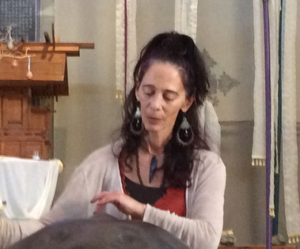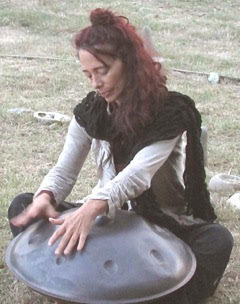Today SevenPonds speaks with Deb Grant, a hospice social worker, sound healing practitioner and conscious dying guide who provides soothing music at the bedsides of those who are nearing the end of life. A cancer survivor herself, Deb has a deep respect for the healing power of music and its ability to ease emotional suffering and physical pain. In her work with the dying and their families, she focuses on simple percussion instruments, including the handpan, bells, chimes and Tibetan bowls.
Editor’s Note: This interview has been edited for length and readability.

Kathleen Clohessy: Hi Deb. It’s so nice to speak with you! Can we start out by telling our readers a little bit about your background and what you do?
Deb Grant: Sure. First, I have to say that I’ve always, even as a child, been fascinated by death. But my early work as a social worker in private practice focused more on grief and loss and helping people who were struggling with substance abuse or life-threatening illnesses. Then, in 1999, when I was 40 years old, I was diagnosed with cancer. I went through very aggressive treatment and almost died more than once. It was a very difficult time, and after I recovered I decided to focus my practice on hospice. I’ve been a hospice social worker now for 13 years.
Kathleen: Wow. I’m sure being so sick and coming close to death, especially at such a young age, had a profound effect on you.
Deb: It did and it has. Since I was first diagnosed, I have relapsed twice, and I’ve been very sick more than once. My speech has been affected as well as my ability to swallow, eat and drink. And while that’s been very hard to deal with, it has also brought me much more in touch with what’s important to me. I realize now that music is what kept me alive throughout my ordeal. And because of that, I’ve been moving in a different direction for the last four or five years, focusing more on my music and how it can help those who are dying and their families in their last weeks, days or even hours of life.
Kathleen: Can you talk a little bit about your music? I understand you play the Hang drum?
Deb: Actually, that’s not completely accurate. The Hang is a particular type of musical instrument that was invented in Switzerland and is made by the company PANArt Hangbau AG. I play the handpan, which is similar to a Hang but not identical. I also play the chimes, Tibetan bowls, bells and the carimba. I’ve been a percussionist and drummer for about 35 years, since I was in my twenties.
Kathleen: I gather from reading about music and healing that certain instruments resonate with the human body/mind in certain ways. Do you think this is true of the instruments you play?
Deb: Absolutely. They are very soothing, especially the handpan. Its vibration resonates with the heart chakra in the center of the chest and helps to slow everything down. My patients say that listening to me play eases their physical pain and brings them to a peaceful, joyful place. I’ve also found that my music helps bring family members together, sometimes for the first time in a very long time.
Kathleen: That sounds wonderful. Can you share some stories about how your music has helped this kind of intimacy come about?
Deb: Yes, there’s one family in particular that I remember very well. They were a big family — five siblings spread out all over the country. Their mom was in her 80s, and she was dying. Her children all wanted to be there with her during her final days. But they weren’t close at all and it was apparent they were very uncomfortable being together in the room. They all wanted to help but none of them knew what to do.
I worked with the family for a couple of weeks. And as they sat in the room and listened to me play, I sensed that the distance between them began to fall away. During the mom’s last few days, she could no longer talk. But her children were able to begin to express to her and to each other how bittersweet these moments were.
At that point, I invited each of them to pick up a chime or a bowl or a bell and connect with their mother through music — to say a prayer or a blessing if they wanted to, or to simply allow the music to speak through them. We did this every day until their mom died.
The family told me later that these final moments with their mother were magical…they created a sense of timelessness and connection that allowed them to come together in a way they never had before. It was very beautiful.
 Kathleen: It sounds like it was!
Kathleen: It sounds like it was!
Deb: I have another story if you’d like to hear it.
Kathleen: Certainly.
Deb: I was working with a women in her late 40s who was dying. She was bed bound and in a great deal of physical pain. I began working with her several months before she died, but initially she only wanted to work one-on-one.
Then, after about of month of working together, she asked her husband to join us. They would lie in bed together and listen to me play, and she would visibly relax. A few weeks later, she asked her children to come in when I made my weekly visit, and then eventually she invited her closest friends to join us as well. At that point there would be about 10 or 15 people in the room. At first they would just sit quietly and listen, but after a while they began to participate….someone would pick up a bell or a chime and start playing along, and then others would join in.
As time went on, this group of loving friends and family continued to visit the woman every week when I came to play. Towards the end, they would push her bed into the center of the room and set up chairs and futons around her…literally encircling her with love and support. Sometimes they would simply listen to me play; sometimes some of them would join me. There was so much love and connection in that room! The woman and her husband both told me that she not only looked forward to these gatherings as she neared the end of her life, but she would feel better for several days afterwards, even though everyone was gone.
This concludes part one of my interview with Deb Grant. Please join us next week as we talk more about her music and her work. And if you would like to hear Deb playing the handpan, watch the video below.

 How Can Music Help Ease Pain and Suffering at the End of Life?
How Can Music Help Ease Pain and Suffering at the End of Life?


 Rutgers Health Study May Improve End-of-Life Care
Rutgers Health Study May Improve End-of-Life Care
 Mary Oliver’s “Heavy” Speaks to the Weight of Grief
Mary Oliver’s “Heavy” Speaks to the Weight of Grief
 Did Our Ancestors Leave Behind a Map of the Afterlife?
Did Our Ancestors Leave Behind a Map of the Afterlife?














